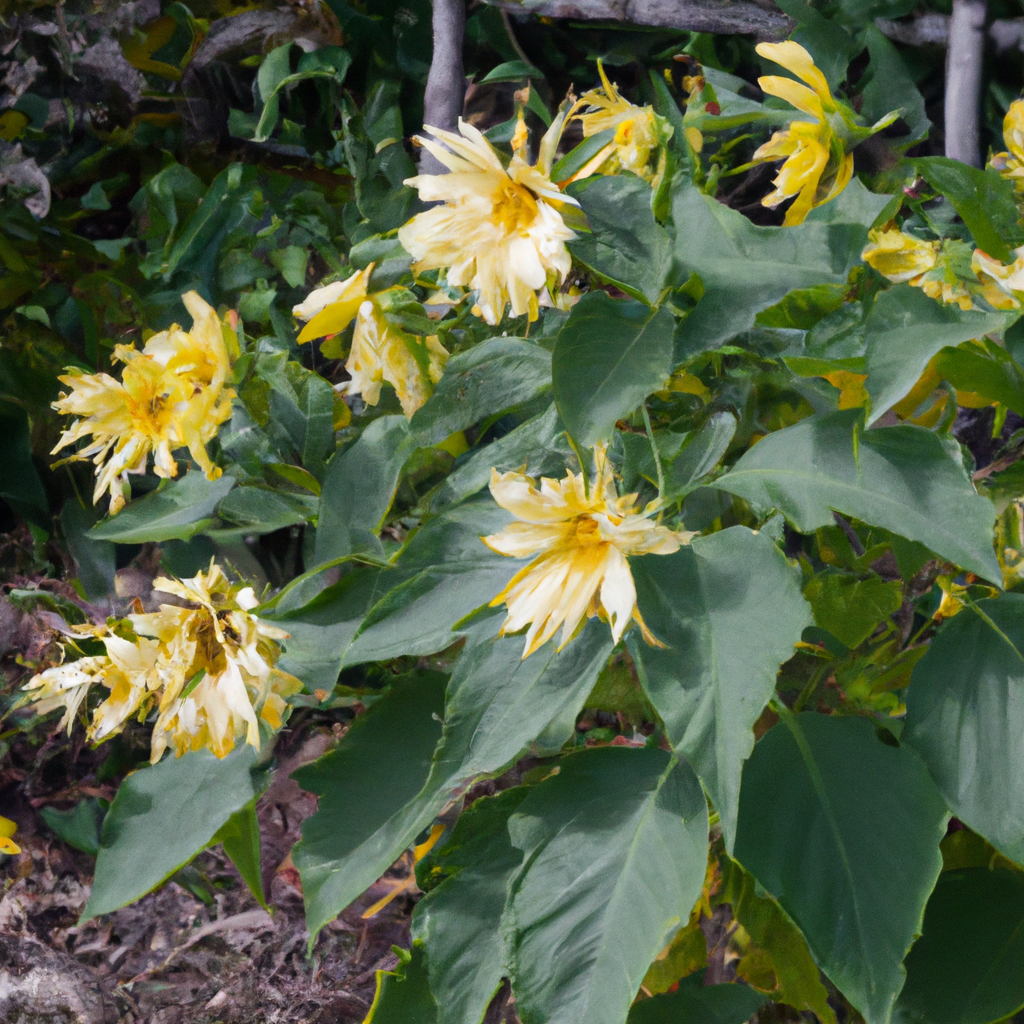Biological Name:
Jerusalem-Artichoke: Helianthus tuberosus
Natural Habitat:
Jerusalem-Artichoke: The natural habitat for Jerusalem-Artichoke is in fields, roadsides, and waste areas in North America.
Description:
Jerusalem-artichoke is a type of flowering plant that is commonly found in fields and other grassy areas. It is a member of the Asteraceae family which also includes plants such as sunflowers and daisies. Jerusalem-artichoke is an annual or perennial plant that produces small yellow or white flowers and clusters of seeds. The plant is often used as a cover crop to improve soil health and suppress weeds. It is also known for its edible tubers which are similar in appearance to potatoes but have a nutty flavor. In some areas Jerusalem-artichoke is considered a weed because of its ability to invade cultivated areas and cause allergies and other health problems.
Frequently Asked Questions (FAQs)
Q: What are Jerusalem artichokes taste like?
A: Jerusalem artichokes belong to the sunflower family. The white flesh is nutty, sweet and crunchy like chestnuts when raw. Baked in their skins, they become more like potatoes with a mild taste of artichoke hearts.
Source
Q: Are Jerusalem artichokes a laxative?
A: They mainly contain inulin, a fermentable fiber that performs multiple beneficial functions in the colon, including bowel movement regulation. Inulin also gives Jerusalem artichokes their sweet flavor. High in potassium and low in sodium, Jerusalem artichokes help stimulate waste elimination.
Source
Q: Why are Jerusalem artichokes so gassy?
A: Jerusalem artichoke, also known as sunchoke, is a starchy edible root. It contains high levels of inulin, a very gassy non-digestible carbohydrate that is fermented by gut bacteria. It has such potent flatulence powers that professional chefs and gardeners have nicknamed it the fartichoke.
Source
Q: Does Jerusalem artichoke need to be peeled?
A: Just scrub them clean – there’s no need to peel them (should you wish to, a teaspoon works well). If you do peel them, drop them into acidulated water until you’re ready to use them because the flesh discolours quickly. Keep an eye on them while cooking as they can turn to mush quite quickly.
Source
Q: How do you prepare Jerusalem artichokes?
A: Peel and cut the Jerusalem artichokes into chunks. Place them in an oiled frying pan and fry on a medium heat until golden on both sides, then add a few bay leaves, cloves of garlic, a splash of white wine vinegar, salt and pepper, and place a lid on top. Cook for 20 minutes, until softened.
Source
Q: What part of Jerusalem artichoke do you eat?
A: The Jerusalem artichoke produces knobbly, white-fleshed (or less commonly, red-fleshed) tubers that can be eaten either raw or cooked. Uncooked, the flesh has a nutty, sweet, crunchy flavor like raw chestnuts or mild radishes.
Source
Q: What’s the difference between artichoke and Jerusalem artichoke?
A: What are Jerusalem artichokes? This vegetable is not truly an artichoke, but a variety of sunflower with a lumpy, brown-skinned tuber that often resembles a ginger root.
Source
Q: Are Jerusalem artichokes anti inflammatory?
A: Anti-Inflammatory Effects of Heliangin from Jerusalem Artichoke ( Helianthus tuberosus) Leaves Might Prevent Atherosclerosis. Biomolecules. 2022 Jan 6;12(1):91.
Source
Q: Is Jerusalem artichoke good for liver?
A: Summary Regular consumption of artichoke extract may help protect your liver from damage and help relieve symptoms of non-alcoholic fatty liver disease.
Source
Q: Are Jerusalem artichokes hard to digest?
A: Jerusalem artichokes (aka sunchokes) are delicious, but known to cause painful gastric issues.
Source
Q: Can artichokes upset your stomach?
A: Artichoke can cause side effects such as gas, upset stomach, and diarrhea. Artichoke might also cause allergic reactions.
Source
Q: What happens when you eat Jerusalem artichokes?
A: They can be eaten raw or cooked. They have a high level of inulin, which is a prebiotic fiber with medicinal properties. It can stimulate growth of bifidobacteria, which fights harmful bacteria and helps reduce certain carcinogenetic enzymes. Jerusalem artichokes are very versatile.
Source
Q: When should you not eat artichokes?
A: There’s an open hole in the center and the leaves are loose.The tips of the leaves are split or shriveled, a sign it is dried out.It feels light, another sign it has dried out.It feels spongy when squeezed.
Source
Q: What are the benefits of eating Jerusalem artichokes?
A: They are rich in iron to give you energy, along with potassium and vitamin B1, which support your muscles and nerves. Although they’re sweet, their starchy fibre stops any spikes in blood sugar levels – indeed they have a lower glycemic index (GI) score than potatoes – and they aren’t fattening.
Source
Q: Are Jerusalem artichokes good for gut health?
A: Jerusalem artichokes contain high amounts of inulin, which is a prebiotic that supports digestive health, as well as a variety of insoluble fibers and caffeoylquinic acid.
Source
Q: How do you get the gas out of Jerusalem artichokes?
A: Modern science concurs: “Boiling Jerusalem artichokes in an acid such as lemon juice or vinegar will hydrolyze the inulin to fructose and small amounts of glucose,†Rastall advises. So I gave it a try, boiling quarter-inch-thick sunchoke slices for 15 minutes in just enough lemon juice to cover them.
Source
Q: Can you eat too many Jerusalem artichokes?
A: Jerusalem artichoke is generally considered safe to eat. 17 However, for some people, its high inulin content can cause digestive discomfort (the vegetable has a reputation for causing a lot of gas). If this happens to you, you may want to limit how much you eat, at least until your body gets used to it.
Source
Q: What happens if you eat too many Jerusalem artichokes?
A: The significant side effect of Jerusalem Artichokes is the presence of dietary inulin fibre. As this substance is non-digestible, there are chances that people are intolerant to it. Thus, people intolerant to inulin may experience indigestion, abdominal pain, diarrhoea, and flatulence.
Source
Q: Why is it called Jerusalem artichoke?
A: A mispronunciation of the name by English speakers led to girasole becoming “Jerusalem.”” It was through this interesting sequence of events that this vegetable became known as the Jerusalem artichoke. Today they are commonly referred to as sunchokes or sunroots.”
Source
Q: Is Jerusalem artichoke anti inflammatory?
A: Anti-Inflammatory Effects of Heliangin from Jerusalem Artichoke ( Helianthus tuberosus) Leaves Might Prevent Atherosclerosis. Biomolecules.
Source
Q: Is Jerusalem artichoke good for you?
A: Jerusalem artichoke nutrition and health benefits Jerusalem artichokes are sweet, nutty, and potato-like, with even more health benefits then their root vegetable cousins. Moser says they’re very high in vitamins, potassium, iron, and fiber. They’re really a very healthy vegetable, she notes.
Source

